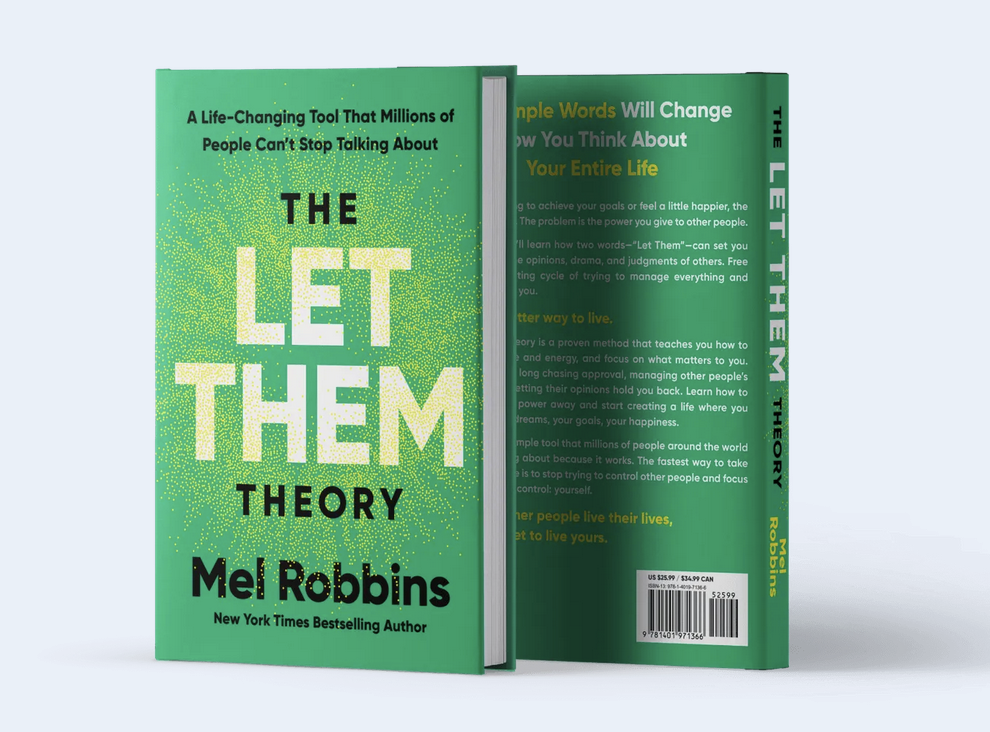
The “Let Them” Theory by Mel Robbins is a mindset framework that encourages letting go of the need to control or fix other people’s actions, decisions, or emotions. It focuses on accepting what you can’t control and focusing instead on your own peace, well-being, and growth. This philosophy can be directly linked to improving gut health because of the strong connection between mental health, stress, and the gut-brain axis.
Here’s how Mel Robbins’ “Let Them” theory can positively impact gut health:
1. Reducing Stress to Support the Gut-Brain Axis
- Stress and the Gut: Chronic stress disrupts the gut microbiome, slows digestion, and contributes to conditions like bloating, leaky gut, and irritable bowel syndrome (IBS). It also increases cortisol levels, which can harm the gut lining.
- How “Let Them” Helps: By adopting a mindset of “let them,” you release the stress of controlling others or external situations. This reduces emotional and physical tension, allowing your gut to function optimally.
- Example: If a family member eats junk food or criticizes your diet, “let them” do so without allowing it to affect your choices or emotional state.
2. Cultivating Emotional Resilience
- Emotions and Gut Health: The gut is highly sensitive to emotions like anger, anxiety, and frustration. Holding onto these emotions can disrupt digestion and increase inflammation in the gut.
- How “Let Them” Helps: This theory encourages you to detach from emotional triggers caused by others. Instead of internalizing negativity or reacting, you focus on your inner peace.
- Example: If someone is being negative, “let them” stay in their negativity while you choose to protect your energy. This emotional resilience supports a calmer gut environment.
3. Focusing on What You Can Control
- Gut Healing Requires Personal Action: Healing the gut involves diet, lifestyle, and stress management, which are entirely within your control. Trying to control others or external events can drain your energy, leaving less focus for self-care.
- How “Let Them” Helps: It shifts your mindset from external to internal, allowing you to prioritize habits like meal prep, eating anti-inflammatory foods, and mindfulness practices.
- Example: Instead of worrying about others’ opinions on your gluten-free or sugar-free diet, “let them” think what they want while you focus on your goals.
4. Letting Go of Food and Social Pressures
- Social Dynamics and Food Choices: Pressure to conform to unhealthy eating habits in social settings can cause anxiety or lead to choices that harm gut health.
- How “Let Them” Helps: This theory empowers you to let go of the need to explain or justify your choices. You don’t have to “fix” how others view your dietary restrictions.
- Example: If friends question your avoidance of gluten or sugar, “let them” express their views while you confidently stick to your plan.
5. Supporting Rest and Recovery
- Stress Impacts Recovery: Overthinking or worrying about external situations keeps your body in a heightened state of stress, reducing your ability to heal and repair.
- How “Let Them” Helps: Letting go of unnecessary worry creates space for rest, better sleep, and recovery—all of which are essential for gut health.
- Example: If you feel pressure to overextend yourself socially or at work, “let them” expect too much while you prioritize rest and downtime.
6. Protecting Your Energy
- Energy and Gut Healing: Emotional energy is finite, and wasting it on situations you can’t control diverts resources from healing. The gut thrives when your energy is focused on nurturing habits.
- How “Let Them” Helps: It teaches you to protect your energy by setting boundaries and letting go of draining dynamics.
- Example: If someone is resistant to your lifestyle changes, “let them” remain in their mindset while you stay committed to your journey.
7. Encouraging Mindful Eating
- Mindful Eating for Digestion: Eating in a calm, relaxed state improves digestion and reduces gut distress.
- How “Let Them” Helps: By releasing stress over others’ actions or the pace of life, you can focus on eating mindfully—chewing slowly, savoring your food, and being present in the moment.
Practical Steps to Apply “Let Them” to Gut Health
- Morning Affirmations:
- Start the day with affirmations like: “I release what I can’t control and focus on my health and well-being.”
- Stress-Reducing Practices:
- Incorporate yoga, meditation, or deep breathing into your daily routine to align with the “let them” mindset.
- Mindset Shift:
- When faced with negativity, repeat, “Let them,” and focus on your next positive action, like preparing a nourishing meal or hydrating.
- Boundaries:
- If certain relationships or environments trigger stress, set healthy boundaries to protect your peace.
- Celebrate Your Progress:
- Instead of seeking validation from others, celebrate small wins in your gut healing journey (e.g., reduced bloating or improved energy).
Sample Scenario: Applying “Let Them” to Gut Health
Scenario: You’re at a family gathering, and someone teases you for avoiding dessert.
Old Reaction: Feeling defensive or caving in to pressure, which could upset your gut.
“Let Them” Reaction: Internally say, “Let them” express their opinions. Politely decline the dessert and enjoy the fruit platter instead. Shift your focus to the joy of being present with loved ones, rather than the critique.
How the Gut Responds to “Let Them”
- Lower Cortisol: Reduced stress improves gut motility and microbiome balance.
- Better Digestion: A calmer nervous system enhances digestion and nutrient absorption.
- Reduced Inflammation: Letting go of emotional triggers lowers gut inflammation and supports repair.
- Improved Microbiome: Positive mental health fosters a diverse, resilient gut microbiome.
By combining Mel Robbins’ “Let Them” philosophy with actionable gut-healing practices, you can create a powerful approach to improving not only your digestion but also your overall physical and emotional health. If you would like help tailoring this mindset to your specific gut health goals, let’s talk. Book a complimentary session below.




